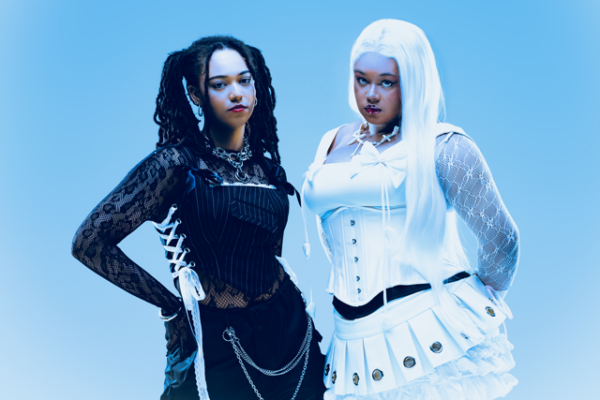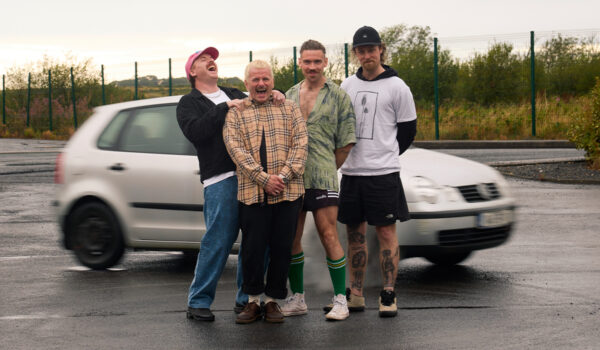“I just remember my eyes filling up and thinking this is so difficult,” begins Jess Eastwood. “But at the same time I knew it was going to be such a good thing when it’s out on a song. That was the first time I ever felt like that.”
The Coach Party bassist and vocalist is reflecting on the cathartic, empowering experience of purging the pain and inner turmoil that inspired their new song Georgina, a standout track from the Isle Of Wight band’s upcoming second album Caramel.
It’s a raw, unvarnished account of her time in therapy, and of her therapist, that’s as much of a cry for help and trying to regain control as it is an acceptance of the void. But while evocative lines like ‘I can’t see a way out / I miss myself / I want to get back’ and ‘I’m locking my doors again / I’m pushing away my friends / They’re grieving’ highlight feelings of isolation and desperation, they didn’t come naturally – lyrics had to be drawn out by guitarist Steph Norris, who was mining her best friend’s psyche for the right words, leaving no stone unturned.
“As friends in a band you’re trying to encourage people to be brutally honest,” adds drummer Guy Page. “Not just because you want to know what’s going on with your friends, but, from a selfish point of view, you know it makes a fucking good lyric.”
This brutal honesty with one another forms the backbone of Caramel. With Guy acting as producer, there was an accepted and encouraged openness with each other in the creative process, with everyone contributing songs about their own lives – from guitarist Joe Perry taking the lead on Medicate Yourself, which deals with numbing yourself (mentally and physically) just to get by, to Fake It, from Steph, which reckons with the effects of hiding your true feelings and simply plastering on a smile.
“Georgina, Fake It and Still Hurts, they’re the songs where I see into the soul of my bandmates as individuals, saying things they wouldn’t normally say, or sharing things they wouldn’t normally share,” says Guy.
Indeed, like the aforementioned Georgina and Fake It, climactic closer Still Hurts – with its wonderfully cacophonous, wall-of-sound ending – wears its heart on its sleeve, dealing with the breaking down of a relationship and trying to navigate the juxtaposing emotions that come with it, even when you know it’s the right thing to do. Elsewhere, the message is much more nuanced, like on the raucous Disco Dream, which on the surface tells celebratory tales of losing yourself in the music on a night out, but is hiding a much more bleak, almost sinister, undercurrent of isolation and loneliness.
“I hear the rawness,” continues Guy. “Some of the songs are more like our collective thoughts, but there’s a few songs that really zoom into an individual and that sticks with me, no matter who I’m listening to. If I can hear the inside thoughts of who is singing it, I love that. I love to hear who is talking to me.”
That one-to-one relationship is essential in this day and age. When we’re surrounded by increasingly more powerful algorithms, creativity is being replaced by artificially generated content, and nobody on our TV or phone screens is who they appear to be, finding genuine human connection through art is like a life force.
And this vitality courses through the record. While some tracks can come from a place of darkness or struggle, the record is bursting with hooky choruses and infectious melodies that are
begging to be played live. Having cut their teeth on tour with the likes of Queens Of The Stone Age and Royal Blood, and knocking it out of the park at Glastonbury and Rock En Seine in recent years, the four friends are building on their alt.rock foundations with an even more addictive, bombastic and invigorating record.
Calling on the effortless cool of Hole, the introspection of Sprints, and punk energy to match the likes of Amyl and the Sniffers and Turnstile, Coach Party have their targets firmly pointed at those big stages they’ve since come to call home. Everything on Caramel feels like an extension and expansion of KILLJOY, packing in as many scream-along lyrics as they can across its 33-minutes runtime.
“This time with the record we want to sell out those venues [on our own],” enthuses Jess. “And sell them out with an incredible album.”
The prime example of this mindset comes in the form of lead single Girls!, which is precision-tooled to send shockwaves through thousands of feverish fans on a nightly basis. Finding influence in the call-and-response energy of Limp Bizkit, it’s driven by the irresistible hook of ‘Where the fuck are my girls!’. Despite its connotations, however, the band insist this isn’t a politically-motivated sentiment, rather one of community.
“No matter who you are, no matter who you think you are, you’re our girls,” smiles Guy. “When you walk out the door you can go back to whatever you want, but being at a gig is an escape for every one of us, we’re all doing this thing because we love to be here. You’re at this gig so you’re one of us. Our girls are everyone in this room.”
It’s the idea of unity and understanding that ultimately glues the album together like, erm, caramel. Even with all four band members bearing their innermost, songs like Fake It and Still Hurts speak to universal truths and shared experiences of heartbreak, self-loathing and biting your tongue for the benefit of others. It’s music with actual substance, not just something sweet to snack on as its name suggests.
But what do they want their girls to take away from the record?
“It is by far the biggest compliment when someone says they’ve been through something recently and your song dragged them out of it,” offers Guy. “That’s so much more heartwarming than, ‘I like that riff.’ If people can take away the therapeutic side of it, that’s the absolute goal for me. I hope that when you listen to it, you put yourself in that situation or picture the person in that situation, so it’s much more of a direct conversation.”
“I struggled to see on a daily basis that everything was sunny and bright, and for people that struggle mentally it’s such a delusion to feed into, which only then makes yourself feel worse,” concludes Jess.
“Honesty is great, whoever you are. Everyone is battling something. And you are not alone.”





